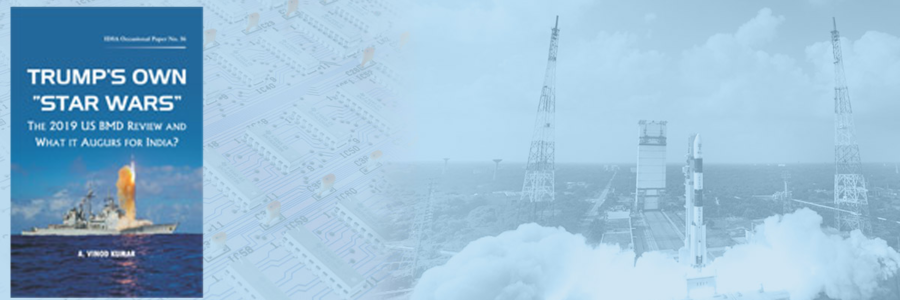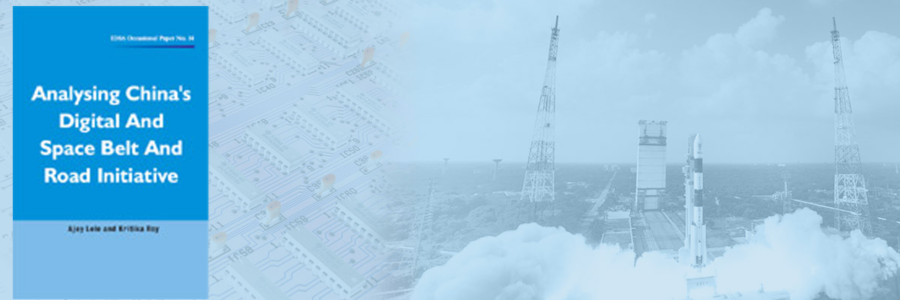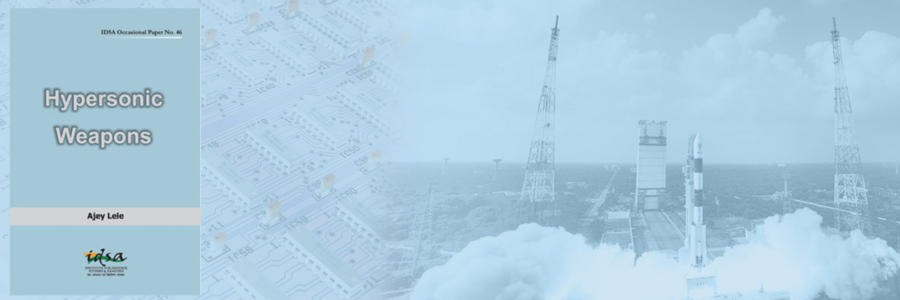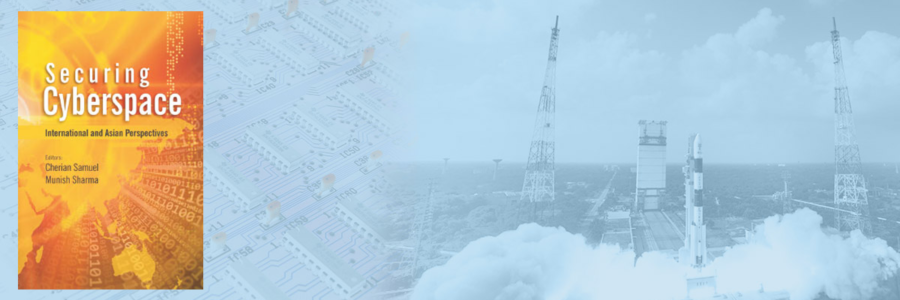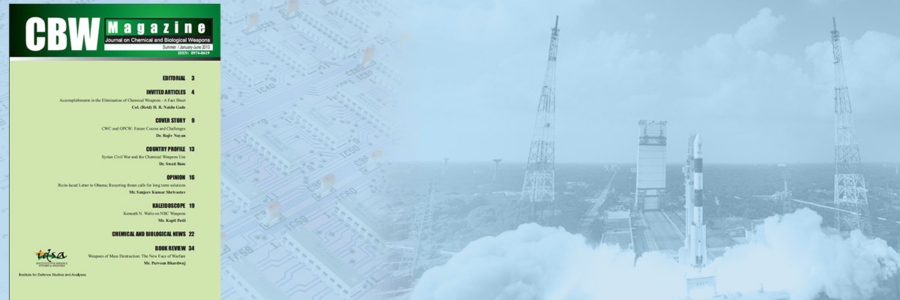Strategic Technologies
About Centre
The Centre focuses on issues related to strategic technologies that have a potential impact on national security. Its main focus is on critical technologies and space technologies. The Centre is engaged in tracking and trend analysis of issues related to Space Security and Cyber Security. The other mandate of the Centre is to undertake research on Biological and Chemical Weapons with a focus on studying the dangers of proliferation and terrorism. The Centre is responsible for the publication of the CBW Magazine – a bi-annual magazine which covers a wide range of issues related to Chemical and Biological Weapons.
No posts of Books and Monograph.
State Actors and Germ Warfare: Historical Perspective
- Animesh Roul
- July-December 2010
Biological Weapons: Coronavirus, Weapon of Mass Destruction? by U.C. Jha and K. Ratnabali
War, when all else fails. The reasons for war could be ideological or for greater control over finite resources but war invariably has violence at its epicentre. Ethics and wars have rarely been concentric in human history; therefore, wars have seen the employment of all possible means. Victory, as the ultimate aim, has forced warring sides to look at multiple options and biological weapons are one such method. Biological weapons are as old as war itself and their primitive recorded use was centuries ago.
- Kishore Kumar Khera
- January-March 2021
Modeling Attribution of Cyber Attacks Using Bayesian Belief Networks
The article makes an attempt to bring to the fore the various factors which are considered in the due process of attribution of a cyber-attack and the correlation of credible attribution with cyber deterrence. The focal point of the article is a three-step approach to model the decision-making process behind attribution of cyber-attacks using Bayesian Belief Networks and a case study to elucidate on the functioning of the model.
- Munish Sharma
- January 2021
The COVID-19 Outbreak: Learnings and The Way Ahead
- Anshu Joshi
- January-June 2020
Stop Turning a Blind Eye to Tear Gas Misuse
- Michael Crowley
- July-December 2018
The Flaw of Immediate Cyber Counter Strikes
A dominant paradigm for militarised cyber operations, owing to a growing interest in such actions, is seeking an ability to strike back and launch cyber counter attacks immediately after being attacked. This commentary challenges view based on the argument that it leads to a contra-productive tit-for-tat game with no decisive or deterrent outcome. It argues that cyber attacks are information, which an initially passive targeted society can gather to refine and consolidate its cybersecurity and over time receive an advantage over the initial attacker.
- Jan Kallberg , Rosemary A. Burk
- September 2017
The US Concept and Practice of Hybrid Warfare
The term ‘hybrid warfare’ has been used by American military experts for more than a decade already. However, until recently, there was no officially accepted definition of the term, and, thus, an ambiguity existed over its meaning. As per the analysis of recent local conflicts in the Middle East and Ukraine by the US political and military elite, hybrid warfare is a conflict where actors blend techniques, capabilities and resources to achieve their objectives.
- Vladimir I. Batyuk
- September 2017
Assessing India’s Cyber Resilience: Institutional Stability Matters
In this commentary, I will use strategic cyberwar theory1 to explain why India has a higher level of cyber resilience than several of its potential adversaries. Even if India has challenges in its government-led cyber defence,2 there are cyber resilience benefits to be drawn from the way Indian society operates, functions and is constitutionally designed and accepted by its constituents, independently of any cyber defence efforts. First, the concept of strategic cyberwar.
- Jan Kallberg
- January 2016
Cyber: Also a Domain of War and Terror
India, the IT nation, did not make a news splash at CyberTech 2014. That is worth a passing thought. Because cyber is the fifth and new domain of warfare, after land, sea, air and space.
- Suryakanthi Tripathi
- January 2015
Video Conferencing Apps: A New Playground for Cyber Criminals
With a new found celebrity status among the video conferencing applications, Zoom now faces a massive privacy and security threat as the platform’s default settings are not secure enough.
- Kritika Roy
- April 11, 2020
COVID-19 and Role of Global Mega Corporations
COVID-19 presents a unique opportunity to the global new-age mega corporations to up their game and showcase their innovativeness and resourcefulness.
- Ashish Chhibbar
- April 03, 2020
NPT@50: The Genesis of a Flawed Bargain
Even after five decades of its entry-into-force, the Nuclear Non-Proliferation Treaty (NPT) is largely seen as a Cold War era instrument that has failed to fulfill the objective of creating a pathway towards a credible disarmament process.
- A. Vinod Kumar
- March 31, 2020
COVID-19 and Cyber Risks
While maintaining cyber hygiene in these disruptive times is indeed a challenge, each organisation should work towards putting in place a tailor-made work-from-home cyber defence strategy.
- Kritika Roy
- March 30, 2020
TikTok: A Ticking Bomb!
TikTok has hooked youngsters around the world. What is worrisome is the lack of understanding about the long-term implications of such social media apps with regard to data protection and national security.
- Kritika Roy
- December 24, 2019
Kudankulam: One Incident, Many Facets
The existing approach to cyber security is heavily tilted towards practising deterrence by denial, essentially by building defences. However, the concept of deterrence needs further tweaking to make it workable in cyberspace.
- Cherian Samuel , Munish Sharma
- December 16, 2019
‘No First Use’ is Not Sacrosanct: Need a Theatre-Specific Posture for Flexible Options
Nuclear doctrines and postures are dynamic processes that evolve with the security environment. Twenty years after India’s nuclear doctrine was first drafted, the time is ripe for a comprehensive review and suitable revisions.
- A. Vinod Kumar
- August 27, 2019
Libra – A Millennial Global Currency from Facebook
Facebook's recent proposal for a stable global cryptocurrency on social media platform has led many to anticipate its positive impact on the global economic system. However, privacy concerns and Libra's planned decentralised approach have raised apprehensions among the regulators around the world.
- Ronnie Ninan
- July 29, 2019
WhatsApp: One Call away from being a spyware
The WhatsApp bug brings to light the same old dilemma between safeguarding individual privacy and enabling the state to undertake surveillance in the interest of security.
- Kritika Roy
- June 03, 2019
US-China Trade War and the High Technology Sector
In this era of complex interdependence, sudden disruptions in supply chains will not only hurt Chinese businesses in the US and elsewhere, but also damage the US economy as well as its reputation as a business destination.
- Munish Sharma
- May 22, 2019
Singapore’s Fake News Act: Lessons for India
By implementing the Protection from Online Falsehood and Manipulation Act (POFMA) 2019, Singapore is demonstrating resolve to fight the growing spread of false news and misinformation campaigns.
- Ashish Chhibbar
- May 17, 2019
Cyber Exercises and the Indian Armed Forces
A cyber exercise – whether CyberEx or its successor – needs to be developed as a platform for practitioners and thinkers to test conceptual and technical skills under near-real-world whole-of-nation scenarios of cyber contingencies.
- Munish Sharma
- May 16, 2019
To Ban, or Not to Ban Huawei
Given India’s dependence on imports for 90 per cent of its telecom equipment, the decision to allow Huawei to bid for 5G should be in line with the national interest, rather than taking sides and constraining options.
- Munish Sharma
- April 03, 2019
The Grandeur of GandCrab
Every time a cyber security organisation comes out with a decrypter to counter the effect of GandCrab, a brand new version of the ransomware is generated by effecting a small fix in the code.
- Kritika Roy
- March 22, 2019
India’s Tryst with 5G
A slight push in the right direction would be much more productive and efficient, such as treating telecommunications as a utility rather than a market, and building innovation and IPR ecosystems rather than incentivizing licensed production.
- Munish Sharma
- March 20, 2019
Why Creating an Indigenous LTE Chipset is Such a Big Deal
India, the second largest smartphone market in the world, needs to encourage and incentivise its ICT industry to not only boost ‘Skill India’ and ‘Make in India’ initiatives but also provide cyber autonomy to its critical cyber assets.
- Ashish Chhibbar
- February 25, 2019
An Era of True Fakes
With increasing advances in artificial intelligence technologies and machine learning, a new era of deep fakes has emerged, which has the potential to weaken the fabric of democratic society.
- Kritika Roy
- January 10, 2019
Bringing Capacity Building in Cybersecurity to the fore
For a global build-up of cybersecurity, capacity building needs to be given much more importance than it has received till date.
- Cherian Samuel
- December 26, 2018
Paris Call: Another Missed Call?
Paris Call could be seen as a positive step towards finding a middle path between Western democracies and authoritarian regimes on the issue of cyber governance.
- Kritika Roy
- December 18, 2018
BIMSTEC: An Unprecedented Opportunity for Collaboration and Cooperation in Cyberspace
The BIMSTEC region offers tremendous opportunities in the field of cyber space. However, the full scope of digital dividend can only be harnessed if the countries of the region are able to get their act together and work as a team at the earliest.
- Ashish Chhibbar
- December 18, 2018
- Visitor No: 000058457
- © Manohar Parikar Institute For Defence Studies and Analysis
-








